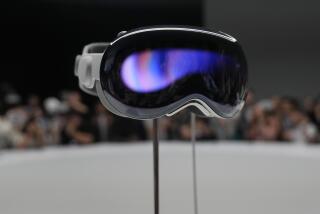Epson aims to take on Google Glass with Moverio smart glasses
- Share via
Wearing a pair of smart glasses, runners could someday race against themselves.
The idea for augmenting real runs with virtual models was a hit with leaders at Epson America Inc. The technology giant, known for its printers and projectors, is trying to be a leader in the emerging smart glasses market.
While the well-known Google Glass eyewear has focused on providing functions similar to smartphones, Epson wants its glasses to be used in ways unlike any other device. Nearly two years after releasing the Moverio smart glasses, Epson invited app developers to its North American headquarters in Long Beach this past weekend to crank out ideas for how to use future versions of the glasses.
PHOTOS: Google Glass re-imagined
USC junior Serhan Ulkumen’s vision stole the show. With the help of Costa Mesa developer Sal Raimi and three friends, Ulkumen -- wearing running shoes, athletic shorts, wristbands and a headband -- showed off the basics of the running app.
Runners often look down at their watches to see if they’re trekking at a faster pace than usual. But glasses with a projector embedded in them can enable runners to see a virtual image of themselves running. The “ghost” image would move at the speed of a previous run down the same route, setting a mark that the individual can try to beat the second time out.
“The technology was finally there to bring digital into real-world exercise,” Ulkumen said. “We are getting real close to that switchover from smartphones to headsets because of these kinds of apps.”
Ulkumen’s team also spoke of virtual victory laps, the sounds of cheering crowds, the ability to share results on social media, and the ability to compete against avatars of the likes of Usain Bolt.
“It’s something that could easily be adopted and brought to the market,” said Trak Lord, a marketing manager for software developer metaio, which co-sponsored the Epson event.
All of this is possible because the Moverio glasses project a mini-screen into a user’s entire field of vision. Users can still roughly see the surroundings behind them because the projections are made onto transparent lenses. That’s unlike Google Glass, where the “projection” is only viewable in a small corner above the normal line of sight.
There are a few hurdles though. Running with the Moverio glasses isn’t exactly simple. It comes with a cord-connected battery pack and miniature Android-powered computer. The pack also includes a touchpad to swipe and tap -- like on a smartphone. They were originally conceived as a way to watch movies and televisions because of built-in 3-D.
But Epson quickly realized they were “too big and bulky” for consumers to spend $700 on for entertainment, said Eric Mizufuka, Epson product manager for new markets.
As the company develops the next generation of the Moverio device, it’s considering adding features such as video-input plugs and a camera. It’s also now looking to consumers and businesses as users.
“Our vision is to really take hold in the workplace first,” Mizufuka said.
He said surgeons, warehouse workers and technicians are all currently testing Moverio smart glasses.
Epson’s effort to attract the attention of developers comes as Google Glass has raised the profile of wearables, electronic devices that people fit onto their body rather than just carry in purses and pockets. Epson also wants to sell more products capable of running apps developed by the public.
Competitors are taking similar approaches. For example, Samsung Electronics Co. is inviting developers to a San Francisco conference in October.
But as one of the few major hardware manufacturers in Southern California, Epson sees an opportunity to be a catalyst for local software programmers to try out wearables.
“Right now is the perfect time for developers to be on the front wave of new technology,” Mizufuka said.
Other ideas presented to Epson at the weekend hackathon included apps to aid with cooking, note-taking, learning about companies at conference booths and creating scary Halloween mazes.
Meanwhile, Raimi from the running-app team said their idea could easily be used in other scenarios such as a football quarterback wanting to analyze his mechanics or a golf player checking out his swing.
ALSO:
Five great Silicon Valley reads, from Burning Man to Netflix
Yahoo offering ‘watch list’ service for $1.99 for expired usernames
Smartphones cut broadband gap, 3% still use dial-up, Pew survey finds







